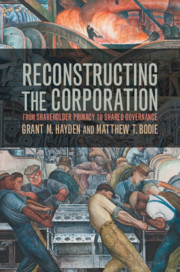Book contents
- Reconstructing the Corporation
- Reconstructing the Corporation
- Copyright page
- Dedication
- Contents
- Preface
- Acknowledgments
- 1 Introduction
- 2 Preference Aggregation in Political Institutions
- 3 Preference Aggregation in Corporations
- 4 The Corporation as Contract
- 5 Shareholder Homogeneity
- 6 The Argument from the Residual
- 7 The Argument from Arrow’s Theorem
- 8 The Shareholder Franchise and Board Primacy
- 9 A Firm-Based Approach to Corporate Voting Rights
- 10 Democratic Participation and Shared Governance
- 11 The German Codetermination Experience
- 12 Conclusion
- Notes
- Index
Preface
Published online by Cambridge University Press: 18 February 2021
- Reconstructing the Corporation
- Reconstructing the Corporation
- Copyright page
- Dedication
- Contents
- Preface
- Acknowledgments
- 1 Introduction
- 2 Preference Aggregation in Political Institutions
- 3 Preference Aggregation in Corporations
- 4 The Corporation as Contract
- 5 Shareholder Homogeneity
- 6 The Argument from the Residual
- 7 The Argument from Arrow’s Theorem
- 8 The Shareholder Franchise and Board Primacy
- 9 A Firm-Based Approach to Corporate Voting Rights
- 10 Democratic Participation and Shared Governance
- 11 The German Codetermination Experience
- 12 Conclusion
- Notes
- Index
Summary
In the preface, we set the stage for the rest of the book. Corporations have a tremendous amount of power and play a major role in a number of contemporary issues, including income inequality, global warming, and the financial crisis. The principal theory of corporate governance – shareholder primacy – is well entrenched in law and practice, but its intellectual foundations are falling apart. Academic groups are split into different camps advocating for more or less shareholder empowerment. The traditional, law and economics arguments for the core governance feature – the exclusive shareholder franchise – have been revealed to rest on faulty assumptions and flawed reasoning. And both corporate governance theorists and corporate and economic luminaries are openly questioning the stability of shareholder primacy as a continuing regulatory norm. There are, however, a dearth of alternative approaches, so shareholder primacy lumbers on toward the point of crisis. It is time to assess where we are and offer a new way forward.
Keywords
- Type
- Chapter
- Information
- Reconstructing the CorporationFrom Shareholder Primacy to Shared Governance, pp. ix - xiPublisher: Cambridge University PressPrint publication year: 2021

